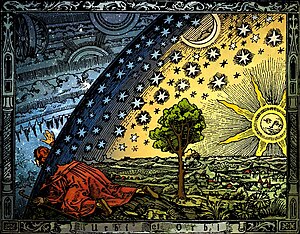Cosmos
Cosmos, in its most general sense, is synonymous with the universe or world, the set of everything that exists, although it is also used to refer exclusively to the space outside the Earth. The term Cosmos also denotes order and organization, it is the universe seen as an ordered or harmonious system.
Originally it was a word used by the ancient Greeks to designate the totality of existence. The Greeks believed that the cosmos was governed by a series of laws ("nomos"), which would be one of the objectives of understanding the first thinkers with whom an embryonic version of the universe would then begin. Greek philosophy. These laws, in turn, were understood to establish a certain order (“diké”), the antithesis of chaos, characterized by imbalance or disorder (“adikía”). Time in the cosmos was not conceived in a linear way as it is today, but in a cyclical way: the periodicity with which certain meteorological phenomena occurred is an example of this (and among others). Concepts such as nothingness, non-being, emptiness, the infinite or the unlimited were not understandable at the time when the term appeared: the Minoan civilization, since they did not exist de facto either. The study of the cosmos, from any point of view, is called cosmology.
Cosmos is all that is, everything that was and everything that will be.Carl Sagan, Cosmos: a personal journey.
Etymology
It comes from the Latin cosmos, which means universe, and this from the Greek term κόσμος (kósmos), which means order, (the) totality or ornaments, being the antithesis of chaos Χάος (Kháos or cháos), which means disorder. The words "cosmetic" and "cosmetic" have the same origin.
Concept
In ancient and medieval philosophy
In Homeric times, in its primitive meaning, it meant ornament and also order and ornament of discourse. According to Philolaus and other ancient authors, Pythagoras was the first to use the term cosmos to refer to the order of the universe, and to the universe itself. Philolaus used this word in the plural to refer to the celestial bodies that circulate around the central focus of the world. Later, in Hellenistic philosophy, it would be used to designate the whole of heaven and earth.
In physics
In physical cosmology, the term cosmos is often used and refers to a space-time continuum within a (postulated) multiverse. In general, our particular cosmos is called "Cosmos".
In literature
The view of the cosmos as “self-sufficient, autonomous nature” is in sharp contrast to the view of nature as a simple mechanism for the growth of animals.
In the opinion of the world of the cosmos, man is part of nature, while, in the opinion of the world of mechanism, man dominates nature.
The philosopher Ken Wilber uses the term cosmos to refer to everything that exists. It is used to distinguish this non-dual universe (which, in his opinion, includes non-ethical and physical aspects) from the strictly physical universe that is the concern ("narrow") of the traditional sciences and is widely associated with the term cosmos .
Contenido relacionado
Cetus
Sirius
Arthur (star)
